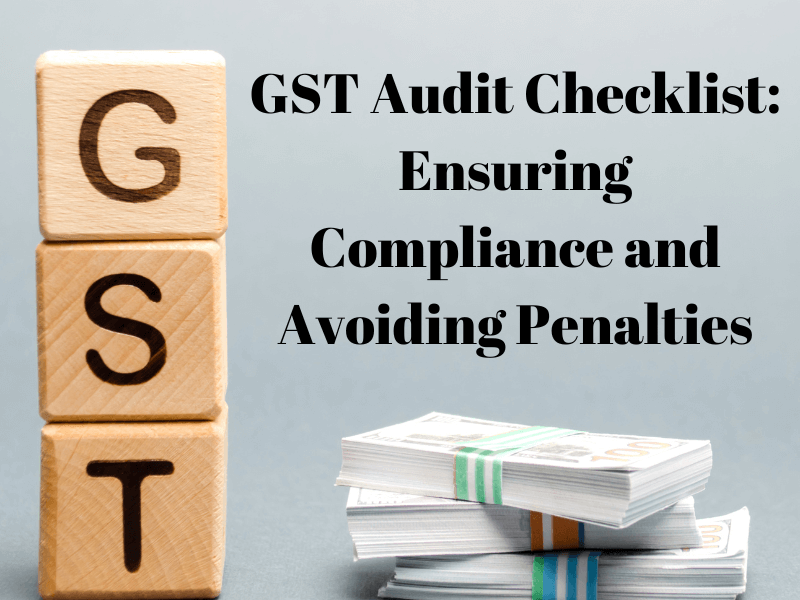GST Audit Checklist: Ensuring Compliance and Avoiding Penalties
Discover a comprehensive GST audit checklist to ensure compliance and mitigate penalties. From documentation review to ITC verification and tax filing assessments, empower your business with proactive measures to navigate GST audits effectively.

In the world of taxation, compliance is key. For businesses operating under the Goods and Services Tax (GST) regime, adherence to regulations is not only a legal obligation but also crucial for maintaining financial integrity and avoiding penalties. A GST audit can be a daunting prospect, but with proper preparation and a comprehensive checklist, businesses can ensure compliance and minimize the risk of penalties. In this blog post, we'll outline a step-by-step GST audit checklist to help businesses navigate this process effectively.
1. Documentation Review:
- Ensure all GST registration certificates, tax invoices, debit/credit notes, and other relevant documents are up-to-date and readily accessible.
- Verify that all outward and inward supplies are properly documented and recorded in compliance with GST regulations.
2. Input Tax Credit (ITC) Verification:
- Review ITC claims to ensure they are supported by valid tax invoices and comply with GST input tax credit provisions.
- Cross-check ITC claims with supplier details and GST returns to reconcile any discrepancies and avoid potential penalties for incorrect claims.
3. Taxable Supplies Examination:
- Verify the accuracy of taxable supplies declared in GST returns against sales invoices, accounting records, and supporting documentation.
- Confirm that GST has been charged and collected correctly on taxable supplies and that appropriate rates have been applied.
4. Export and Import Compliance:
- Ensure compliance with GST regulations concerning export and import transactions, including proper documentation, tax treatment, and compliance with export refund provisions.
- Verify that GST exemptions or zero-rated supplies are correctly applied to eligible export transactions to avoid penalties for non-compliance.
5. Compliance with GST Return Filing Requirements:
- Review GST returns filed during the audit period to ensure timely submission and accuracy of declarations.
- Verify that all outward and inward supplies, input tax credits, and other relevant details are accurately reported in GST returns.
6. Financial Records and Accounting Systems:
- Assess the adequacy and reliability of financial records and accounting systems for GST compliance purposes.
- Ensure that accounting systems capture and record GST transactions accurately and facilitate easy retrieval of information for audit purposes.
7. Compliance with GST Payment Obligations:
- Verify the timely payment of GST liabilities and assess any penalties or interest levied for late or non-payment.
- Ensure compliance with GST payment procedures, including the use of appropriate payment modes and adherence to prescribed timelines.
8. Assessment of Transitional Provisions Compliance:
- Review transitional provisions applicable during the transition to GST to ensure compliance with transitional requirements and eligibility criteria.
- Verify the correctness of transitional credit claims and assess any adjustments required for transitional provisions compliance.
9. GST Compliance Training and Awareness:
- Ensure that relevant staff members are adequately trained and aware of GST compliance requirements, procedures, and obligations.
- Conduct periodic GST compliance training sessions to keep employees updated on changes in GST regulations and best practices.
10. Engagement with Tax Professionals:
- Seek guidance and support from tax professionals or GST consultants to ensure comprehensive compliance with GST regulations.
- Engage tax professionals for GST audit assistance, review of compliance procedures, and advice on minimizing tax risks and penalties.
By following this comprehensive GST audit checklist, businesses can proactively ensure compliance with GST regulations, minimize the risk of penalties, and maintain financial integrity. Remember, compliance is not a one-time task but an ongoing commitment that requires diligence, attention to detail, and proactive measures to stay abreast of changes in GST regulations and best practices. With proper preparation and a systematic approach, businesses can navigate GST audits with confidence and peace of mind.
Latest Updates
FSSAI Regulations for Genetically Modified Foods
18 Jan 2026What to Do If You Receive a TDS Default Notice
15 Jan 2026ca4filings.com Services




























-registration.png)



